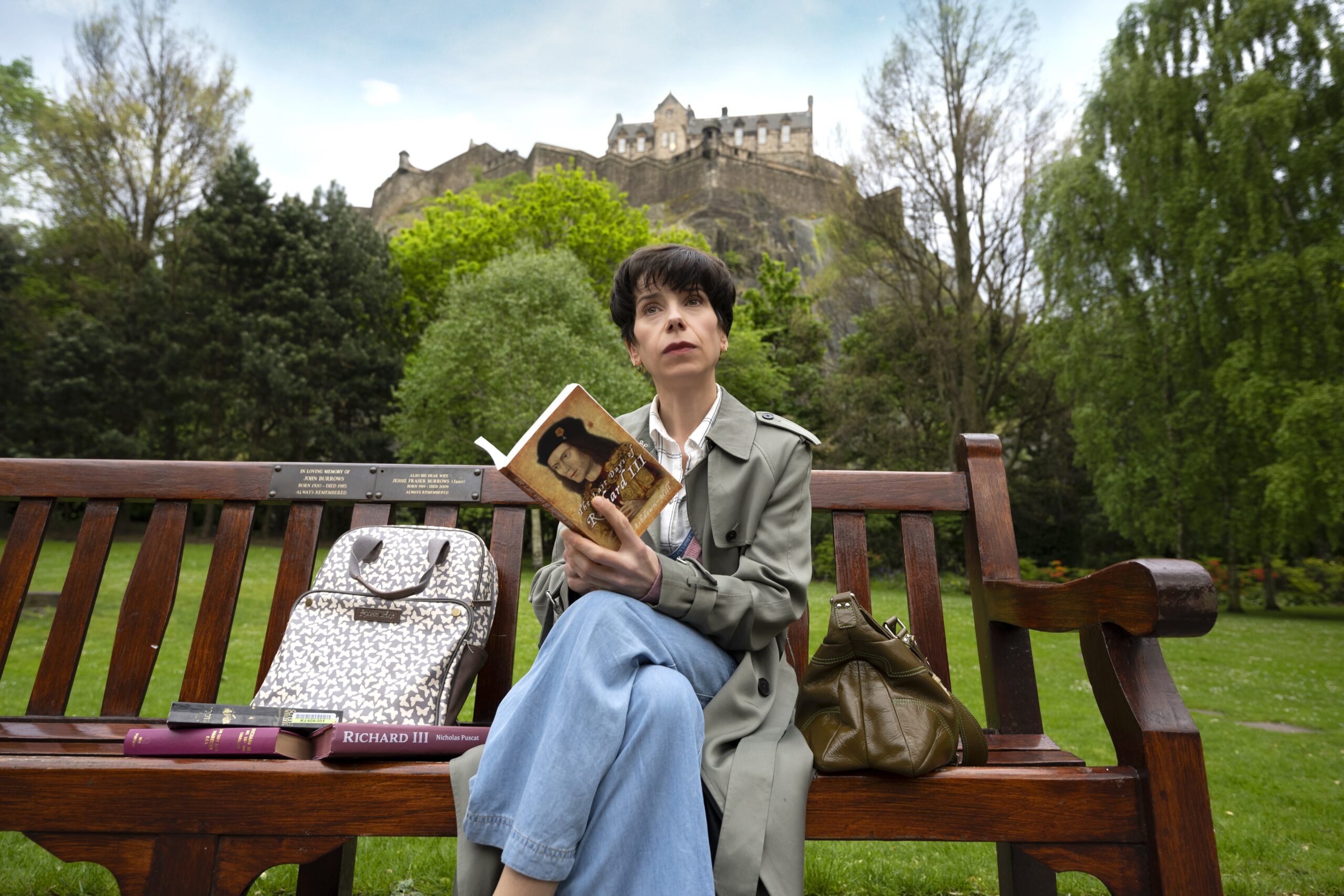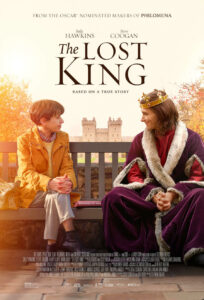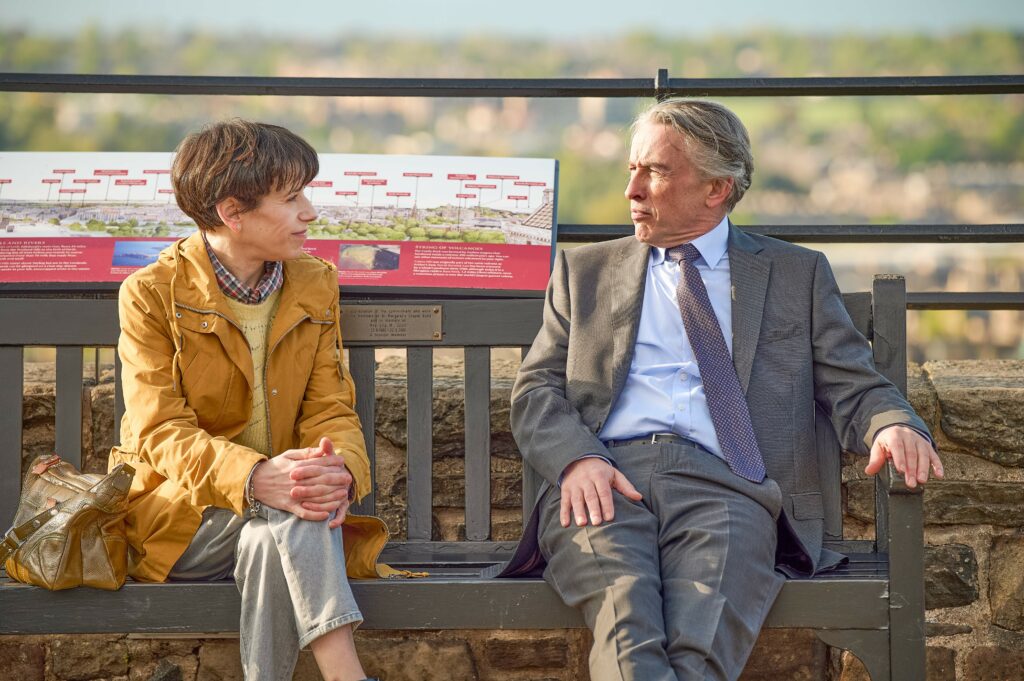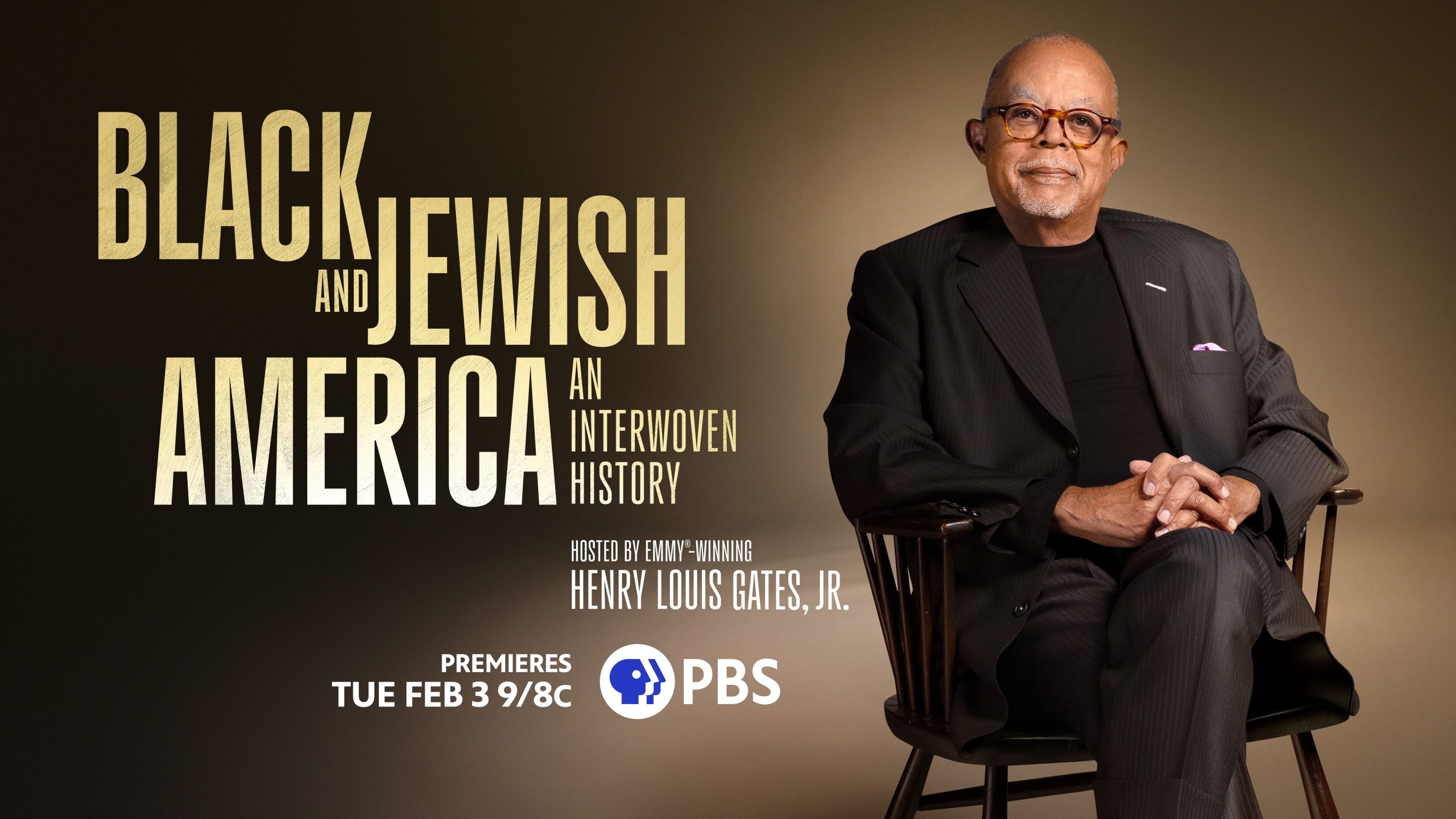
Oscar-nominated/BAFTA-winning screenwriter Jeff Pope spoke with Solzy at the Movies about The Lost King, which is now playing in theaters.
Pope reunites with his Philomena co-screenwriter Jeff Pope to pen the script for The Lost King. It’s a Philomena reunion all around because Stephen Frears handles directing duties behind the camera. This time around, it’s another feel-good story as Sally Hawkins portrays Philippa Langley, an amateur historian investigating the burial location of King Richard III. Coogan stars alongside Hawkins as Philippa’s husband, John. It’s a stranger-than-fiction true story–after 500 years, the king’s remains were discovered under a parking lot in 2012. Even though family, friends, and academics were skeptical, Langley kept at her search. She wouldn’t be ignored and today, the film shines a new light on King Richard III, however controversial he might be.
The film premiered last September during TIFF at the Royal Alexandra Theatre. IFC Films acquired the North American right a few weeks prior to the world premiere. Coogan, Pope, and Frears were on hand for the world premiere, which came as the United Kingdom was mourning the passing of Queen Elizabeth II.
The Lost King is now playing in theaters.

How did you first hear about Richard III’s remains being found in a car park?
Jeff Pope: Well, I remember watching the documentary The King in the Car Park on TV. Actually, before that, I remember reading in the newspapers and hearing it on the news that he’d been found. It’s such a bizarre headline, isn’t it? A 500-year-old lost king has been found by a middle-aged housewife from Edinburgh. You almost can’t believe that that sentence exists, but it does. And yes, then I watched the documentary. That was interesting to see. It’s interesting just to see how low tech it was. It was literally a car park in the middle of Leicester and some diggers, shovels, and spades and Philippa are looking on hoping and her intuition, just her feeling, I think he’s here, I feel it.
It’s one of those stranger-than-fiction stories.
Jeff Pope: Yeah. That’s exactly what it is.
Did you approach Steve Coogan or did Steve approach you about co-writing?
Jeff Pope: No, it definitely started with Steve. We collaborated on Philomena and not long after that, he started talking to me about it. He’d had a meeting with Philippa. I remembered the documentary and I remembered hearing about it on the news. The big kickoff for me was he and I spent three-four days in Edinburgh with Philippa and starting to drill down into what had happened. It wasn’t just Philippa’s story, it was Richard’s story, too, because I was starting from a position of just parroting the line, as per Shakespeare, that he was evil, that he murdered the princes in the tower, he murdered his brother, murdered his wife, was a hunchback, inverted commas, etc. In order to understand why Philippa felt strongly about him as she did, because that was the process for her it was—she kind of felt very much how unfairly Richard had been treated and how wrongly he’d been branded as a monster by Shakespeare. That led to her wanting to find him. It was that way round and so we needed to understand that, too. We needed to understand why she felt like she did about Richard so we started to dig into him, too.
As a writer, how do you stay true to Philippa Langley’s story while also making it dramatic for audiences to stay captivated and compelled?
Jeff Pope: Yeah, that’s exactly the knife edge that writing movies about actual events balances on because you can’t hide behind it’s a true story. That’s why it doesn’t quite hang together. That doesn’t work. You have to sit alongside movies that are fictional and yet, there’s a duty on the writer to treat the subject fairly. That’s what we did. For instance, why does Richard III appear in the story? The answer to that was, well, there were obvious benefits because you get to hear Philippa’s thinking as she trades dialogue with Richard III. Richard III didn’t actually appear to her but what we built on was Philippa said in her head, she’d had conversations with him. She’d kind of say, would you have done this? Whatever it was, would you have done this? Would you have gone there? Would you have tried to do this? And so, what would you do now? We built on that. The dramatic license was that we personified Richard and there he was as a character. But everything else in it, we completely stand by. The University of Leicester weren’t very happy with how we told the story. Steve and myself suggest that’s because we were holding a mirror up and they didn’t like what they saw in the mirror.
What were some of the challenges that came with writing the script and bringing it to the screen?
Jeff Pope: Well, as ever, what you need to do is to find something that rises above just the bare facts that this happened, this happened, this happened, this happened—what is it about? That took a lot of thinking. In the end, really, the story that we were telling was to trust your intuition. I think one of the reasons why I Philippa had some of that credit and kudos taken away from her after her achievement was because the academic world was suspicious of her. Yeah, here was a woman who said, why do you want to start digging here under this letter R that’s painted on the tarmac? In truth, it was because she had a feeling that’s where he was. She’d done some research. Of course, she had. It wasn’t like she was looking for him in Nigeria. She was in a car park in Leicester and the Battle of Bosworth was a short distance away so there was method to it. There were lots of open spaces in Leicester where he could have been and there were lots and lots of—surely, 500 years later, wherever he was, was going to now be built on and we’re never going to find him again. But she had a feeling and so that the message or the thing that we want to grab you as you watch this film is, trust yourself, trust your feelings and your instincts, because that’s what Philippa did and look what happened.

I felt Sally Hawkins delivered one of the best performances of her career in The Lost King. What was it like to watch her act with her in the film?
Jeff Pope: Well, I’m so glad you felt that. I thought she was magnificent, too—an almost miraculous combination of simultaneous strength and fragility. Also, she’s very funny as well. I thought she matched Steve Coogan laugh for laugh in those parts of the script where we were having fun. It was fascinating to watch her work. She feels everything. That was what I thought about her. Like the best actors and actresses, all that mattered to her was finding the truth in her performance—why am I like this? Why am I saying this? How am I feeling at this point? I’ve seen it before in other actresses and actor but, man, she plugs into the emotion of that character at that moment. She didn’t spend a lot of time with Philippa before filming because she didn’t want it to be an impersonation of Philippa. She wanted to take all the strands, the script, whatever she’d read about Philippa as she watched Philippa being interviewed. She did have a couple of conversations with Philippa but it wasn’t like just outside every shot, Philippa would stand there looking on and cut and she’d say, was that right? That didn’t work. It was an interpretation, not an impersonation.
I’m tried to imagine an actor on set with the real person looking over after every take.
Jeff Pope: I have worked on stuff where it’s not literally every take but where the actor encourages that. But equally, it’s just whatever the process that works for them. It’s some of them. A lot of them are like Sally and just want to come up with their interpretation of the character.
How did it feel to premiere the film in Toronto around the same time that the Queen died?
Jeff Pope: That was slightly out-of-body experience. It was really extraordinary, too—it’s embarrassing, I’m a subject the United Kingdom—70 years that she reigned for and that there you are. This film about one of her long lost predecessors, the story of how he was found, brought back to life, really, should happen on the day that she passed away.
It’s interesting, one of the things that we discovered, as we worked on the story, was that in fact, there is a cabinet maker in South London who has technically more of a claim to the Crown than the Queen ever did. If you follow the line—Richard III was the lawful king and therefore, the Crown should pass down through his descendants. Henry Tudor killed him at the Battle of Bosworth, grabbed the throne, and then the Crown passed down through his line, which went to Queen Elizabeth II. Richard III’s line continued and so there is a guy—I’ve forgotten his name now. He’s a cabinet maker, he lives in London and he’s a long, long, long lost relative of Richard III. The thing about the Crown and monarchies is possession is everything. The fact that Tudor grabbed the Crown in battle by killing the previous king, once he’s recognized as king, which happened in the wake of Richard’s death, that’s it. Whatever the morality and the legality of the situation, he’s now king, and it all passes down through his. It was a sobering moment, though, to be there and stand up in front of everyone in Toronto on the day that she died.
With being nominated for an Academy Award for Philomena, how do you stay grounded?
Jeff Pope: Well, what happened to me was my success, in that respect, came I was in my 50s when we got nominated for Philomena. It was a wonderful experience—when we won the BAFTA, Steve and I, for the screenplay, and we were nominated for the Oscars. It was great. I thoroughly enjoyed every moment of it but because I was that bit older and I understood myself, my qualities and my weaknesses, I stayed grounded because I only took on stuff that I felt I could do as good a job as anyone else. Not saying I’m the best but in my head, I’m the only one who could write this story but I want to say to myself, Yes, I think I can do this as well as anyone. That meant something like a Marvel movie was not for me because there are people who do that better. Fantasy and that kind of that kind of piece, I didn’t fall into the trap of trying to chase that. I thought no, do what you’re good at.

I’d be remiss if I did not add that I enjoyed watching Stan and Ollie.
Jeff Pope: That’s very kind of you. It was a huge emotional journey for me. That was, again, many years in the making. There’s a reason why it was so important to me and it was because as a little boy in the 60s in the UK, television was very interesting. First thing in the morning, nothing. If you turn the television on, blank screen, I think between ten till 1 PM, there was a thing called Watch with Mother and then it would go off again. It would come on again at 5 PM. For large bits of the day, there was no television and television was quite rare. Saturday mornings, the greatest treat which were reruns of Laurel and Hardy films. As a kid, I didn’t realize it at the time, but as a kid starved of television, this was like the greatest gift, these Laurel and Hardy films. It went in and stayed in. Writing about them was a joy. He’s looking at me now. Stan Laurel. I found it in some antique shop out here in Florida. I can’t remember where now but he was staring at me.
It was so nice to chat with you and congrats again on the film.
Jeff Pope: Thank you very much. Real pleasure to talk to you.
Likewise.
Jeff Pope: Thanks, Danielle. Cheers.
IFC Films releases The Lost King in theaters on March 24, 2023.
Please subscribe to Solzy at the Movies on Substack.






